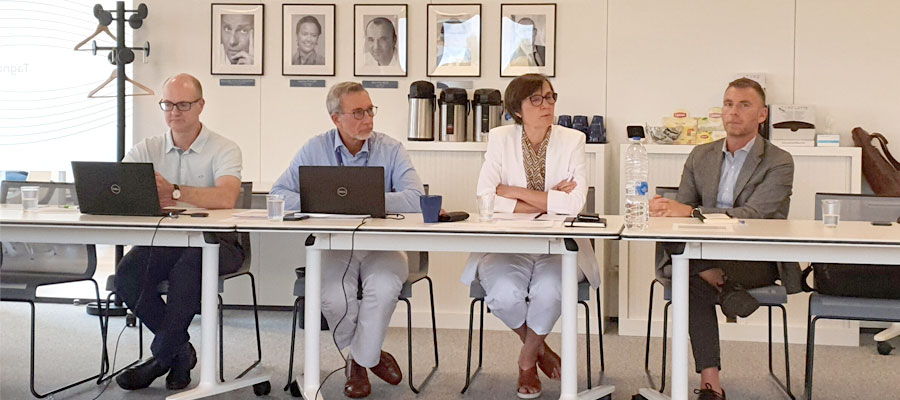PRESS RELEASE: Better treatment for better health: lifting the veil on treatment optimisation
27 Jun 2022
Stakeholders exchange views on patient-centred clinical research at EORTC and AIM’s seminar
Treatment optimisation is defined as clinical research in real-world conditions, aimed at improving the standard of treatment for patients. On 23 June, the European Organisation for the Research and Treatment and Cancer (EORTC) and the International Association of Mutual Benefit Societies (AIM) held an event “Better treatment for better health: lifting the veil on treatment optimisation”. This was an opportunity for stakeholders to hear about, and exchange perspectives on this so far overlooked aspect of care provision.
Treatment optimisation is still far out of reach for our healthcare systems
Access to optimal treatment is often hindered by insufficient evidence on clinical added therapeutic benefit for patients in real life, as well as the lack of information on whether the product could have been efficient at a lower dosage, or in combination with another product or intervention. All of this can lead to suboptimal decision-making at pricing and reimbursement level, suboptimal treatment for patients as well as wasteful spending of healthcare resources.
One of AIM’s objectives is to promote universal access to high quality and efficient health care without inequalities. AIM strongly supports any approach that could help generate better data on the appropriateness of medicines’ use for healthcare systems.
The EORTC’s mission is to improve cancer patient survival and quality of life. This can be achieved only if clinically valid but also efficient therapies are proposed to all cancer patients. Treatment optimisation research is definitively a mandatory step for patient access.
A first exchange of stakeholders’ perspectives
After Denis Lacombe, CEO of EORTC, set the scene at the beginning of the meeting, Caroline Voltz, from the European Medicines Agency, presented the Cancer Medicines Forum, launched by EORTC and EMA to identify key research questions and best methodological approach to improve the clinical use of cancer medicines. Jeroen Nugteren presented TreatMeds, a cross-stakeholder initiative supported by Dutch healthcare insurers to ensure patients access to expensive medicines by improving the efficiency of medicines use. Yannis Natsis, Director of the European Social Insurance Platform (ESIP), explained that weak evidence leads to issues down the access pathway, down to pricing and reimbursement decisions. Lydie Meheus, Managing Director at the Anti-Cancer Fund and former breast cancer patient, showed that optimisation is in many cases the only way to find the best treatment formula for patients. Among other topics, participants exchanged during the discussion on the need to involve payers in EMA’s Cancer Medicines Forum, but also on the relevance to escalate TreatMeds’ example in an international setting.
Using the European legislative reform agenda on pharmaceuticals to make treatment optimisation possible in the EU
The seminar took place as the healthcare community expects the European Commission’s proposal on the reform of the European pharmaceutical legislation and the new Health Technology Assessment regulation. On both files, it is necessary to adopt regulatory processes that are conducive to the generation of better evidence and treatment optimisation. Such an approach needs to rest on better-defined responsibilities, better-designed studies and well-understood mutual expectations from all stakeholders. Only such an approach will be conducive to better outcomes for patients and for public health as well as to fairer medicinal products prices.
Contact
EORTC
Isabelle Gautherot
Communcation@eortc.org
AIM
Thomas Kanga-tona
thomas.kanga-tona@aim-mutual.org
Related News
Meet the new EORTC Board
9 Jul 2024
We are pleased to announce the release of the EORTC 2023 Annual Report
17 Jun 2024
Dr Denis Lacombe, EORTC CEO, appointed stakeholder co-chair of ACT EU advisory group
24 May 2024
Clinical Trials Day 2024: a Q&A on pragmatic clinical trials
20 May 2024
EORTC/EMA workshop suggests an international way forward for treatment optimisation studies
8 May 2024
EORTC’s Participation at the ESTRO Congress 2024
29 Apr 2024
EORTC: Advancing research and treatment for rare cancers
29 Feb 2024
EORTC Fellowship Programme: celebrating more than 20 years of impactful collaboration
22 Feb 2024
Appointment of Malte Peters as EORTC Strategic Alliance Officer
9 Feb 2024
Unique series of workshops in partnership with the European Medicines Agency (EMA)
7 Feb 2024


